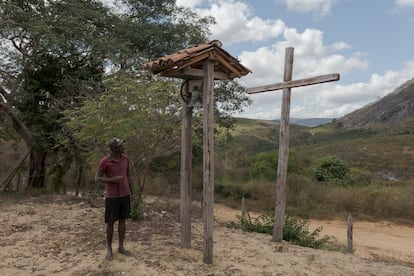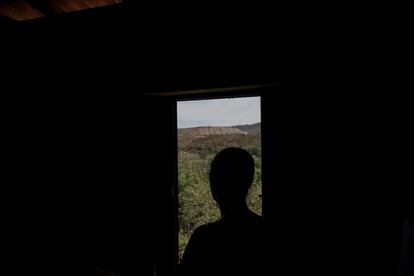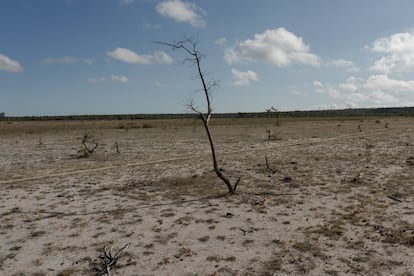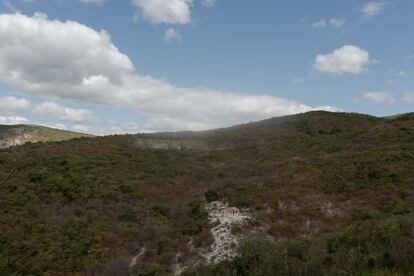EL PAÍS offers the América Futura section for free for its daily and global informative contribution on sustainable development. If you want to support our journalism, subscribe here.
For years, the Jequitinhonha River Valley in southeastern Brazil was stigmatized as a poor corner of the country, marked by hunger and illiteracy. But beneath the parched crust of a landscape constantly plagued by drought, it turns out that a treasure was hidden: huge reserves of lithium, the “white oil,” as some local politicians say.
The mineral, which is essential for making batteries for smartphones and electric cars, has sparked a new rush worldwide and has filled this depressed region with optimism, but it is also leaving a worrying trail of side effects.
In the small town of Araçuaí, with just over 30,000 inhabitants, there is a mood of euphoria. “We have a lot of hope. We can transform all this mineral wealth into good services for the population, to improve their lives,” says the mayor, Tadeu Barbosa, by phone. For just over a year, the streets of this town of low houses and welcoming people have been bustling with mining company workers. House prices have skyrocketed and there are sometimes even no sliced bread in supermarkets, admits the mayor. This is the epicentre of Brazilian lithium production. Last year the country produced 15.2 billion tonnes of this mineral, which is key to the energy transition.

The triangle formed by Argentina, Chile and Bolivia has the largest reserves, but Brazil is rapidly increasing its production and is already the world’s fifth largest producer, according to the Ministry of Mines and Energy. All production comes from the state of Minas Gerais, most of it from the Jequitinhonha valley, where Araçuaí is located.
Local authorities quickly saw the goldmine: lithium as a golden opportunity to leave behind a past of misery. The governor of Minas Gerais, Romeu Zema, an ally of former president Jair Bolsonaro, presented the project with great fanfare. Lithium Valley Brazil on the Nasdaq, the New York Stock Exchange, in 2023. The company that has taken the lead is the Canadian company Sigma Lithium. Just a year ago, it shipped the first tons of Brazilian lithium bound for China. The company claims to be the first mining company in the world to produce “green lithium” because it uses clean energy, is supplied with non-potable water and does not use dams with waste, which in this case is prepared and sold to other companies.

The piles of waste can be easily seen from the houses in the small village of Poço Dantas, where the families most affected by lithium extraction live. Since the plant opened, they have had to deal with constant dust and the noise of the explosions that the company carries out underground to extract the mineral. Many of the humble brick houses have cracks.
“They advertise green lithium, that it is sustainable and all that, but in reality it is not. It is greedy exploitation,” criticises Vanderlei Pinheiro de Souza, a resident of the rural area. He is a family subsistence farmer, “what used to be called a farmer,” he jokes. He grows beans, corn and manioc for his own consumption and, when he has anything left over, he sells it to make money. He feels that with the arrival of the company, a traditional way of life is being broken and the already damaged natural balance of the area is being threatened.

The Jequitinhonha Valley is a semi-arid region where the sound of water in the rivers is only heard a few months a year. Decades ago, eucalyptus monocultures dried out the soil more than necessary. That is why alarm bells went off when Sigma Lithium, which already has a plant running at full speed, asked for permission to do an “initial geological assessment” in Chapada do Lagoão, a nature reserve with 139 springs that acts as the valley’s great water pump. Both the city council and the company wanted to know how much lithium is hidden beneath this protected plateau. Authorization depended on the park’s governing council, made up of entities and people with diverse interests and whose director is Vanderlei. The humble farmer says he received countless pressures to give the go-ahead.
The permit was approved by a narrow majority of votes, but it made little progress. The Movement of People Affected by Dams (MAB, in Portuguese), very active in the area against the abuses of mining companies, appealed to the courts and the Public Prosecutor’s Office asked to stop the process, arguing that the local communities, basically a handful of quilombos, that is, settlements founded by enslaved blacks fleeing forced labor, had not been consulted. In an email sent to EL PAÍS, the company says that although the allegations that they intended to begin extracting lithium from the natural park causing significant damage were “completely false and unfounded,” it chose not to explore that area.

For the mayor of Araçuaí, that issue is over. His biggest concern now is managing resources for a boom The city is facing a demographic crisis that the city was not prepared for. According to Sigma Lithium, in just one year it has already created a thousand jobs and another 13,000 indirect jobs. With the arrival of new workers and residents, the demand for more security, more hospital beds or more school places increases, but this city hall and its small staff cannot cope. The needs have arrived before the promised resources that lithium would bring, the mayor admits. In Brazil, the law provides that mining companies pay 2% of the value of their sales to the State to compensate the regions where the minerals are extracted, and that 60% of these resources collected remain in the hands of the municipalities.
The theory sounds good, but the municipal coffers are not exactly buoyant. “It is far below what we expected. It is true that we are at the beginning of operations and adjustments must be made, but last year we received two or three monthly payments and this year only one, in the month of February,” he laments. The mayor is confident that, if the situation normalizes, the city budget can grow by 5% thanks to the royalties of lithium.

Despite his initial frustration, Barbosa finds it difficult to criticise lithium companies. In addition to providing jobs for his neighbours, the huge profits of these multinationals also allow them to occupy the space in public policies that local administrations cannot reach. Sigma Lithium, for example, has a microcredit programme that benefits 1,800 women, has paid for the renovation of a rural school and has plans to donate 3,000 cisterns to the poorest families to store rainwater. Another mining company, Atlas, will start up another plant this year and has just paved a “fabulous” road, the mayor says.
“It’s the same old marketing,” says Nicolly Caroline, an activist with MAB, the organisation that prevented Sigma Lithium from exploring the lithium deposits in the natural park, over the phone. She lists a long list of problems, from the dust that covers the city to the increase in gender violence due to the numerous foreigners who have been arriving in recent months. In her opinion, the lithium rush is bread for today and hunger for tomorrow. “Of course people need to work, to survive. But all these jobs are temporary. People who go to work in certain areas come home worse, because of respiratory illnesses (…) then the company leaves and what we are left with are the impacts. We are a humble people, when will we be able to buy an electric car?” she asks.
#Lithium #manna #brings #prosperity #headaches #poorest #corners #Brazil